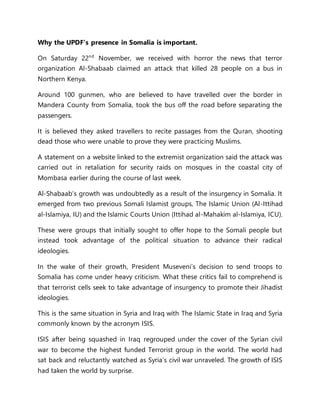
Why UPDF's presence in Somalia is crucial
- 1. Why the UPDF’s presence in Somalia is important. On Saturday 22nd November, we received with horror the news that terror organization Al-Shabaab claimed an attack that killed 28 people on a bus in Northern Kenya. Around 100 gunmen, who are believed to have travelled over the border in Mandera County from Somalia, took the bus off the road before separating the passengers. It is believed they asked travellers to recite passages from the Quran, shooting dead those who were unable to prove they were practicing Muslims. A statement on a website linked to the extremist organization said the attack was carried out in retaliation for security raids on mosques in the coastal city of Mombasa earlier during the course of last week. Al-Shabaab’s growth was undoubtedly as a result of the insurgency in Somalia. It emerged from two previous Somali Islamist groups, The Islamic Union (Al-Ittihad al-Islamiya, IU) and the Islamic Courts Union (Ittihad al-Mahakim al-Islamiya, ICU). These were groups that initially sought to offer hope to the Somali people but instead took advantage of the political situation to advance their radical ideologies. In the wake of their growth, President Museveni’s decision to send troops to Somalia has come under heavy criticism. What these critics fail to comprehend is that terrorist cells seek to take advantage of insurgency to promote their Jihadist ideologies. This is the same situation in Syria and Iraq with The Islamic State in Iraq and Syria commonly known by the acronym ISIS. ISIS after being squashed in Iraq regrouped under the cover of the Syrian civil war to become the highest funded Terrorist group in the world. The world had sat back and reluctantly watched as Syria’s civil war unraveled. The growth of ISIS had taken the world by surprise.
- 2. However, some will argue that this rise was inevitable as the Syrian people needed a group that could protect them from President Bashar Assad’s tyranny. They looked to ISIS when everyone else turned a blind eye and ISIS’s ranks grew exponentially. President Obama recently acknowledged that U.S. intelligence officials "underestimated" the threat posed by the Islamic State and overestimated the Iraqi army’s capacity to defeat the militant group. The United States is now dealing with a conundrum in Syria, as the U.S.-led military campaign against the Islamic State is helping Syrian President Assad, whom the U.N. has accused of war crimes. What Obama is trying to do now is what President Museveni sought out to do when he sent that first contingent of fighters to Somalia. The African Union Military force is necessary to shrink Al-Shabaab’s capacity, cut off financing and eliminate the flow of foreign fighters. Without this intervention, we ran the risk of allowing a radical group to take complete control of a strategic location like Somalia. When a coastal country’s political structure breaks down, neighboring landlocked countries around it run the risk of complete isolation. The implications of having a Terrorist group running Somalia would not only have severe economic but also security implications. This has been the case where the proliferation of piracy in Somalia has caused substantial international trade implications. Uganda’s presence in Somalia is also legal and permitted under International Law. A country is permitted to use military force against terrorism in another country with the consent of the latter's government. Somalia has a sovereign right to protect itself from terrorist violence, and to call on other countries to help. The other permitted use of military force is if a country is acting in self-defense. Terrorist crimes or campaigns do not usually meet the high threshold of an
- 3. "armed attack" which triggers a right of military self-defence under international law, particularly where the terrorist group is not controlled by another country. Some international lawyers may argue that when terrorist violence rises to the level of an armed conflict – as it has in Somalia – foreign countries may no longer intervene to aid the government. This is because foreign intervention is thought to interfere in the right of a foreign population to freely choose its political future, even by resorting to civil war to change its government. Legal opinions are divided on this view. Uganda's intervention is, also subject to Article 2(4) the United Nations Charter which calls for sovereignty for all members. Thus far, the UPDF Amison contingent has complied with the international law of war and international human rights law. In particular, the law of war requires Uganda only to target military objectives and to spare civilians, and not to cause excessive civilian casualties. Human rights sometimes need to be defended by hard military power and this is a perfect example of this need. Muhangi Kenneth Lawyer mk@signumadvocates.com